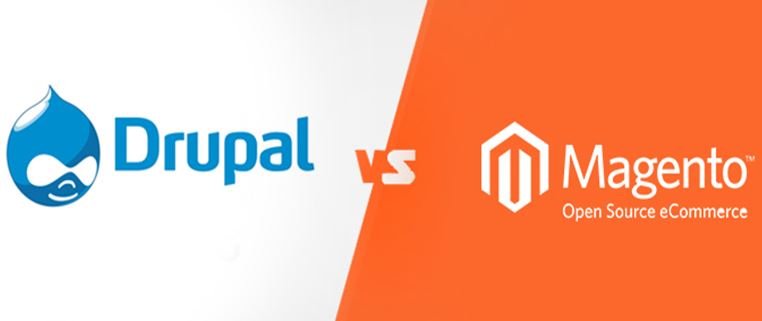Digital Marketing
Magento vs Drupal. Which One to Choose?

When you want to buy something, you try your best to find the one that is most suitable for you. The same goes for online shopping. Today businesses are so indulged in winning over more customers that they don’t focus on their eCommerce store. Which platform are they using and how well is it working for their business. This raises the question of defining which is the best eCommerce platform for your business. In the wide range of platforms, two that stand out are Magento and Drupal. This incites the old question of this vs that. Therefore, We will Discuss in detail how these two are different and which one is better for your business.
Whether to use Magento or Drupal is dependent on your business and its requirements. Deciding on which platform to use depends on several factors. Magento Development can be a bit tricky for some people. Similarly, Drupal has an extensive range of functionalities to choose from. Therefore let’s discuss in detail how are they different from each other and how to choose the right one for your business.
[lwptoc]
Defining Magento

Magento is an open-source platform written in PHP. It is widely used by businesses to create their eCommerce websites. Magento was officially launched in 2008, and since then it has been the choice of more than 250,000 website owners so far. This makes Magento one of the most widely used eCommerce platforms.
Formerly owned by eBay for four years, Now owned by Permira funds since 2015. According to an estimate, eCommerce stores running on Magento take in over $50 billion annually.
Magento has two editions:
- Magento open-source (community edition) is a free plan. Despite being free it fulfills most of the basic eCommerce needs. The program code can be easily customized to meet certain requirements.
- Magento Commerce (Enterprise Edition) is a premium plan with added functionalities and official support.
Some of the most prominent businesses using Magento include Coca-Cola, Vizio, Rosetta Stone, Ford, Land Rover, Christian Louboutin, etc.
Also Check: Zero To Hero Redesign Your Website With Us
Advantages of Using Magento
- Ensure high speed, even if there is a large influx of visitors.
- Multiple Payment options including PayPal.
- Rich with built-In tools for managing online trading.
- Built-In functionalities including different languages, currencies, reports, discounts, coupons, and much more.
- Allows you to manage different online stores from a common center simultaneously.
- High-speed page loading with a built-in caching system.
- Access to HTML and PHP code.
Disadvantages of Magento
- Difficult to manage large stores, as it is hard to master.
- Development cost is much higher as compared to other CMS.
- Developing and maintaining cost is quite high.
- Fresh webmasters can have difficulties handling even with the installation and configuration process.
- Hard to customize templates and develop extensions as compared to other popular systems.
What is Drupal?

Drupal is also an open-source platform developed in PHP. Unlike Magento, Drupal can be used to create any website let alone eCommerce stores. It is highly customizable and can be used to develop complex websites offering boundless functionalities for your website or eCommerce store. With more than 60,000 websites powered by Drupal and 30,000 modules, it is on its way to becoming one of the biggest contenders in the market.
Drupal has two versions:
- Drupal commerce 1x: for Drupal 7
- Drupal commerce 2x: for Drupal 8
Some of the well-known brands using Drupal are whitehouse.gov, Tesla, NBC, Harvard University, Weather.com, fooda.com, etc.
Advantages of Using Drupal
- Has a general authorization between partner sites.
- In case of an overload, offers a server protection mechanism.
- Wide range of free themes and templates to choose from.
- Allows creating websites or stores in multiple languages.
- You can easily manage and structure content no matter what the size.
- Offers flexibility in choosing the format of posts including HTML, full HTML, and PHP from the admin panel.
- Site administration is quite easy as compared to other CMS.
- Easy installation and maintenance.
- Well-placed security system for better performance.
Disadvantages of Drupal
- Requires good hosting for better performance.
- Rely heavily on modules to work properly.
- Difficult for new webmasters to handle.
Comparing Magento and Drupal
The next step is to compare both Magento and Drupal to see how they both perform in their respective areas and which one comes out on top.
Features and Functionalities
Magento
A few years ago Magento was the biggest and the best eCommerce platform in terms of usability. Arguably it still is as it clearly dominates the eCommerce world.
Magento boasts a host of robust features and functionalities offering a wide range of solutions and a seamless experience for the customers. With Magento 2 you get tons of premium built-in functionalities that merchants want. Minimizing the need for additional modules making it highly viable. Some of the prominent features include:
- Customer Segmentation
- Visual Merchandiser
- Company Credit (B2B)
- Requisition List (B2B)
- Company account and sales rep
- Rule-based related products
Drupal
On the other hand, Drupal is quite basic with functionalities. Although not as extensive as Magento, it offers all the basic features and functionalities that are required for developing and running a website or an eCommerce store. It offers features such as order tracking, payment processing, creation of order processing pages, shipping, etc. Some other features include:
- Customized attributes for product pages
- APIs for payment gateways
- Discount pricing
- Calculation of fees and ADS
- Dynamic product displays
Scalability

Magento
With new products being released every day, it is essential that your eCommerce store performs efficiently with the increasing inventory size. Scalability is defined as how well your eCommerce store performs under high traffic, product management, and huge inventory. In this regard, both Magento and Drupal are highly scalable.
When it comes to a large inventory and product management, nothing can beat Magento. Magento is the perfect choice for merchants having a large eCommerce store with a huge visitor influx and a wide range of products. Magento can handle around 50,000 visits/hour quite easily. Magento 2 offers a layered structure of 4 tiers including:
- Client
- Page Cache
- Application
- Database
These four tiers can be easily optimized for better performance and scalability. Making it the go-to choice for large businesses.
Drupal
Despite Magento being the established platform, Drupal is no inferior in this competition. In fact, the web server requirements for Drupal are much modest as compared to Magento. The minimum required RAM is 64 MB, making it highly viable for businesses of all kinds. Keeping in view the recent times, considering Tesla uses Drupal for their website speaks a lot.
Content Management

Drupal
When it comes to content management, there is no beating Drupal. It is without any doubt the king of content management. Drupal Commerce allows admins to create different types of content with customized fields and attributes with flexibility. If you want a content-rich eCommerce store or website then there is nothing wrong with opting to choose Drupal Commerce.
Magento
As opposed to Drupal, Magento is not much flexible in regards to content management. Magento has a basic yet fundamental content management system. It is not much versatile when compared to other CMS. Magento only allows you to add pages and a little content to different categories of pages and attributes of the products. In order to add more content, you need to step into the custom domain. This will cost greatly and will need continuous support.
To suffice it all, Drupal is way ahead of Magento in terms of content management.
Learning Curve
Magento
Magento is a more demanding eCommerce environment. Fresh webmasters will find it hard to even install and configure Magento. Even for experts, Magento can be a challenge at times. It requires advanced PHP skills. If you are not an expert, it is better that you opt for a dedicated developer or a Magento development company to develop and customize your eCommerce store. Once done with the coding, handling the store operation from the admin side is much easier.
Drupal
As compared to Magento, Drupal is much easier to understand and operate. You don’t need a dedicated coding expert to install, configure, and customize Drupal Commerce. The interface is clean, easy-to-use, and flexible. This helps both admin and visitors and creates a great experience for customers and store owners. Moreover, online help for Drupal can be obtained through engaging the Drupal community, and the Slack support channel and forum. There are currently 20,000 questions on the forum. Which enables developers and admins to get assistance from the active community.
Pricing
Magento
As discussed above, Magento is open source and free to use and download. You just have to pay for the hosting. With the premium edition, you have to pay annually based on the gross revenue of your business. This may seem costly at first, but with such advanced features, you will not be disappointed. In fact, when it comes to additional functionalities there is no comparison with Magento. Other platforms require additional modules for this purpose, with Magento you don’t have to worry about all of this.
Drupal
Drupal is also an open-source platform. It is more of a developer-oriented platform. Although there is no technical cost of entry, the development and maintenance can cost hundreds of thousands of dollars. Depending on the scale of your website and how complex your store or website is. Moreover, the ongoing maintenance will require the services of a certified developer. Continuously working for improvements while keeping in accordance with updates and critical improvements.
| Metrics | Magento | Drupal Commerce |
| Content Management | Basic content management system | Allows to create complex content relations |
| Installation | Easy to Install | Easy to Install |
| Learning Curve | Demanding learning curve | Easy to Learn |
| Features and functionalities | Can handle complex online stores | Good for simple shopping stores |
| Multilingual | Multiple Store Views helps in building a multilingual site | Has in-built modules to create a multilingual site |
| Admin Interface | Complex interface | Easily customizable |
| Cost | A costly yet efficient premium version | Free but high costs on maintenance |
| Security | Relatively less secure | One of most secured |
Magento or Drupal. Which one to choose?
Was Magento or Drupal Commerce developed for you?
While Drupal was designed for content management, Magento is additional eCommerce-driven. you may get to modify Magento to deliver content.
If you position your website as an oversized online store with out-of-the-box eCommerce expertise and swish performance, don’t hesitate to select Magento.
But if you would like your website to be content-rich (than simply a web store looking) wherever premium eCommerce options don’t seem to be terribly necessary, think about using Drupal.
Read more: SEO Tool to Rank Your Website in 2021
-

 Celebrity4 weeks ago
Celebrity4 weeks agoIs YNW Melly Out Of Jail? What Is The YNW Melly Release Date, Career, Early Life, And More
-

 Sports4 weeks ago
Sports4 weeks agoMore Than Just a Game: How College Sports Can Shape Your Future
-

 Tech3 weeks ago
Tech3 weeks agoAI Software: Transforming the Future of Technology
-

 Tech3 weeks ago
Tech3 weeks agoAll About Com. Dti. Folder Launcher: Features, Benefits, Tips, And More













